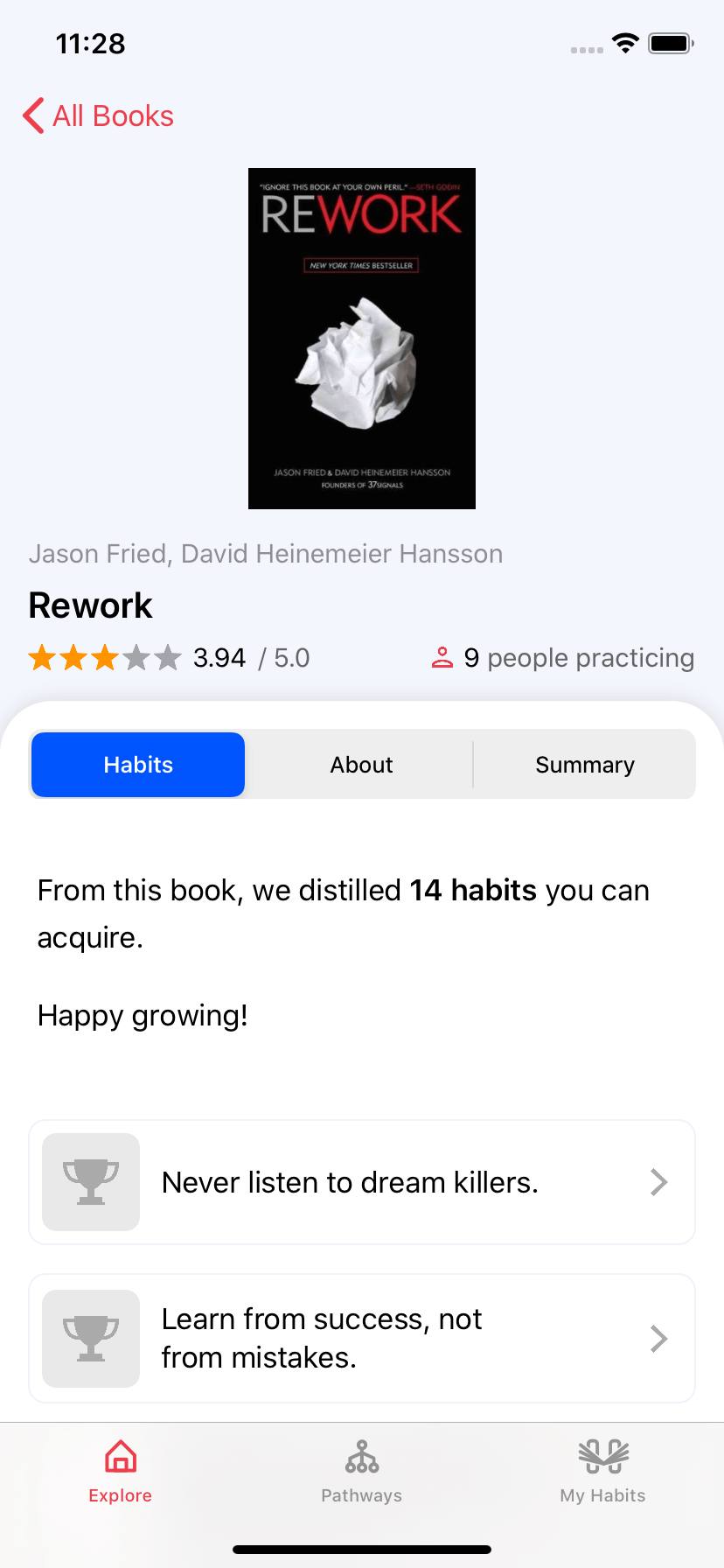
Rework
by Jason Fried, David Heinemeier HanssonRework by Jason Fried and David Heinemeier Hansson offers a new approach to create and manage your business. It’s not based on academic research; it’s based on personal experience. This book has a unique perspective on building companies. No matter what stage your business is in, this book has guidance for you. From brand new business owners to seasoned pros, there is advice on rearranging your business and reworking your work.
What our common sense tells us and what we hear about business creation can be incorrect. For instance, to succeed, you don't need a business plan or a ton of employees. There are other more important things to focus on. And this book explains all the details.
Takedowns
“They say you can’t succeed without making financial projections and five-year plans. They’re wrong.”
Learning from failures is overrated. Other failures are not your failures. If someone failed because of cash flow, a problem with their team, or bad business ideas, it’s their failure. Not yours. So, don’t spend time thinking you should “fail early and fail often” if your goal is to succeed.
Don’t trust five-year business plans. It’s impossible to predict what will happen so far in advance. There are just too many variables, such as market conditions, competitors, or the economy. Writing a business plan or financial plan will make you feel as if you are in control, but these plans are really just guesses. Feeling in control can be dangerous to your company because you may not be able to improvise as quickly if some part of your plan fails. You must be able to take advantage of opportunities as they come along.
How big do you want to grow your company? Our ego pushes us to grow fast and grow big. However, there might actually be a perfect size for your company, and it might not be big! The perfect size for your company could be 10 people, 50 people, or even just you. It’s important to remember that often big companies wish they could be more flexible. But they have huge overhead costs for offices, benefits, and employees. Staying small has a lot of advantages, and it might be the better choice.
Actions to take
Go
When you solve someone else’s problem, you work in the dark. When you solve your own problem, everything becomes clear quickly. Solving your own problem is much better because you know exactly what you want to accomplish. Making products that solve your problems is always a better choice.
Just having an idea for a business is not enough. Ideas do not have real value. Execution is the key. So, instead of just thinking, start doing something. If you don’t have enough time, find it. There is always a way to find time for things that are important to you, so find the time for your new project.
Define why you're doing what you’re doing. What is it that you stand for? Your customers will like having a lot of features in your product. But you may find that you lose your high standards just to earn a few more bucks. However, what you stand for is very important because this will create so-called superusers. Superusers are people that will follow your every step and promote you for free. Standing up for what is important will also earn you criticism and even haters. And that’s fine. You can’t satisfy everyone.
Actions to take
Start a business, not a startup
“A business without a path to profit isn’t a business, it’s a hobby.”
Don’t find investors if it’s not really necessary. Having more people on the management board forces you to give up control. Investors want their money back at some point, which can create more stress and may push you to do things that you don’t really want.
Nowadays, everyone wants a startup. They want to get huge investments, hire a bunch of people, and not worry about early revenue. This is delusional. A business must earn money to survive, and it’s better if you figure out how to earn this money early on. If you don’t know how your business will earn money, you have a hobby, not a business.
You don’t need an exit strategy. Your exit strategy is something that potential investors or even business partners will ask you for. If you aim to sell your company in the future, then you spend time worrying about who will buy you instead of how to satisfy your customers. Customers should be the center of your attention not selling the company.
Progress
“Getting to great starts by cutting out stuff that’s merely good.”
Not having time/money/people/experience is not so bad. In fact, it can be good. It will make you more creative about doing things with limited resources. So, don’t complain, just stretch your limits and do what you can do.
What’s the epicenter of your business? What are the elements that you must have? These are important questions because these are the only things you should be focused on. There are always a lot of things that you “could” do and “want” to do; however, if it’s not directly related to the core of your business, you shouldn’t do it. It’s better to make a great product focused on a few small elements than to try and touch everything and have a weak, incomplete product.
Actions to take
Productivity
You and your team are productive when you do something real. All the charts and documents that your team prepares can be just another layer of abstraction that leads to nothing. Instead of this abstraction, do something tangible. Instead of talking about design, create something. Instead of describing your product, make a mock-up. Go from abstraction to something concrete.
Beware of distractions from your work. If you have 2–3 meetings during the day, and you work in an office where 2–3 guys walk up to speak with you because they need something—that’s enough distraction to kill your productivity. That’s enough distraction that it becomes hard to make anything meaningful. That’s why, very often, weekends and early mornings are the most productive times. Try to create more long uninterrupted stretches of time for yourself.
Actions to take
Competitors
Even though copying is an effective part of the learning process, copying a business rarely works. If you copy something, you lack a deep understanding of why it works. You’re not leading, you’re just following. Copying is a recipe for failure.
When your business is growing, people will start copying you. The best way to protect your business from competitors is to make yourself an integral part of the business. Your obsession should be part of how the company works. For example, Zappos is obsessed with customer support, so all new employees must answer customer service calls for four weeks before moving into the position they were hired for. There are a lot of companies selling shoes, but none of them has Tony Hsieh—the CEO with an obsession for customer service.
Saying that your competition sucks is good, because you differentiate your business. Everyone who thinks you’re right will rally to your side. Audi does it, Apple does it, and Dunkin’ Donuts does it. Remember, to beat the competition, you don’t have to be better than they are. You just have to have something different.
Actions to take
Evolution
Learn to say no. If you say yes to everything, every idea, every customer suggestion, and every collaboration project, things will become too complicated. You will add too many sources of friction into the equation. You will scare new customers. And working on things that you do not truly believe in isn’t fun! It’s better to have a clear vision for your business and do things that you want to do. Say no to everything else. Listen to your customers, yes, but then give yourself permission to forget the things they request. If you can forget it, that means it’s not very important.
When you get new ideas that you are excited about, give the ideas time to cool off. Exciting ideas often become nice-to-have a week later. And nice-to-have is not good enough to put everything else on pause and pursue.
Do not oversell your product. If a person buys your product, and then it offers less than it should (for example, it’s too complicated or has too many features), then the person will be disappointed. Instead, surprise the person with your additional features after purchase. This way, you will build a long term relationship.
Promotion
Before your company grows, it’s a great time to experiment and test crazy ideas. Because you have fewer customers, you won’t upset too many people if something goes wrong. So welcome this time when few people know you, before your company becomes popular, as an opportunity to explore and experiment.
Content marketing is a great way to promote products. It’s cheap, and it builds a special connection with your audience. With content marketing, you can share all that you know, and people will love you for it. Through content marketing, you can show your soul and your imperfections. This allows you to build an authentic image of who you and your company are.
In contrast, press releases are a very bad way of promoting products. In fact, they are basically spam. You write them and hope that someone will read them, but people are aware that they are fake and exaggerated. They’re not worth writing. Instead, call someone, write a personal note, or contact niche bloggers. They will care more about your story. And your story will better target the audience you are looking for.
What is marketing? Marketing is everything you do. It’s not a department in your company. It’s everything. It’s the product, your emails, your invoices, and even the error messages in your product. So think of everything inside your company as marketing.
Actions to take
Hiring
“Never hire anyone to do a job until you’ve tried to do it yourself first.”
It’s important that you hire people in positions that you understand well and have tried to do yourself. This way, you will hire the right people, and you will be able to manage them. For example, before hiring someone for customer support, you should do the job yourself until you understand how to do it effectively.
You should only hire a new employee when you have more work than you can do with your current team. This is when it’s really necessary to hire someone.
Also, don’t hire too many people too fast. That will create an environment where everyone avoids drama, is too polite, and doesn’t tell the truth.
Actions to take
Damage Control
Sometimes you have to tell your audience some bad news. Don’t wait and don’t hide it. Communicate this bad news loudly and clearly. It’s much better for your reputation for you to share this news than for rumors to circulate or for a third party to accuse you of something. If you know how to share bad news, you show that you care about your customers and other people.
Consider putting all your people on the front line from time to time, even people that typically work far away from customers such as programmers or chefs. To understand how to create a product or service for real people, putting all your employees on the frontline can be a valuable experience.
Actions to take
Culture
“Rockstar environments develop out of trust, autonomy, and responsibility.”
Company culture is not something you create. It’s something that happens. You cannot direct the culture by setting rules or enforcing policies. You cannot install a company culture. You just have to be patient and to give it time to develop.
Actions to take
Don’t just read. Act.



